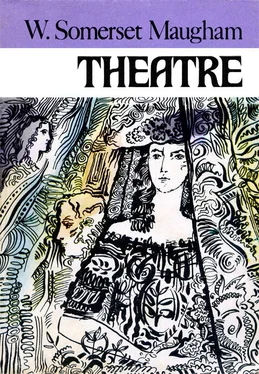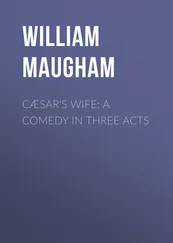The last words she said with a scorn that would have withered a whole front bench of cabinet ministers. She began to gesticulate.
‘It’s ridiculous to suppose that I could have got to my position if I hadn’t got sex appeal. What do people come to see an actress for? Because they want to go to bed with her. Do you mean to tell me that I could fill a theatre for three months with a rotten play if I hadn’t got sex appeal? What is sex appeal anyway?’
She paused, looking at herself reflectively.
‘Surely I can act sex appeal. I can act anything.’
She began to think of the actresses who notoriously had it, of one especially, Lydia Mayne, whom one always engaged when one wanted a vamp. She was not much of an actress, but in certain parts she was wonderfully effective. Julia was a great mimic, and now she began to do an imitation of Lydia Mayne. Her eyelids drooped sensually over her eyes as Lydia’s did and her body writhed sinuously in her dress. She got into her eyes the provoking indecency of Lydia’s glance and into her serpentine gestures that invitation which was Lydia’s speciality. She began to speak in Lydia’s voice, with the lazy drawl that made every remark she uttered sound faintly obscene.
‘Oh, my dear man, I’ve heard that sort of thing so often. I don’t want to make trouble between you and your wife. Why won’t men leave me alone?’
It was a cruel caricature that Julia gave. It was quite ruthless. It amused her so much that she burst out laughing.
‘Well, there’s one thing, I may not have any sex appeal, but after seeing my imitation there aren’t many people who’d think Lydia had either.’
It made her feel much better.
REHEARSALS began and distracted Julia’s troubled mind. The revival that Michael put on when she went abroad had done neither very well nor very badly, but rather than close the theatre he was keeping it in the bill till Nowadays was ready. Because he was acting two matinées a week, and the weather was hot, he determined that they should take rehearsals easy. They had a month before them.
Though Julia had been on the stage so long she had never lost the thrill she got out of rehearsing, and the first rehearsal still made her almost sick with excitement. It was the beginning of a new adventure. She did not feel like a leading lady then, she felt as gay and eager as if she were a girl playing her first small part. But at the same time she had a delicious sense of her own powers. Once more she had the chance to exercise them.
At eleven o’clock she stepped on to the stage. The cast stood about idly. She kissed and shook hands with the artists she knew and Michael with urbanity introduced to her those she did not. She greeted Avice Crichton with cordiality. She told her how pretty she was and how much she liked her hat; she told her about the lovely frocks she had chosen for her in Paris.
‘Have you seen Tom lately?’ she asked.
‘No, I haven’t. He’s away on his holiday.’
‘Oh, yes. He’s a nice little thing, isn’t he?’
‘Sweet.’
The two women smiled into one another’s eyes. Julia watched her when she read her part and listened to her intonations. She smiled grimly. It was exactly what she had expected. Avice was one of those actresses who were quite sure of themselves from the first rehearsal. She didn’t know what was coming to her. Tom meant nothing to Julia any more, but she had a score to settle with Avice and she wasn’t going to forget it. The slut!
The play was a modern version of The Second Mrs Tanqueray, but with the change of manners of this generation it had been treated from the standpoint of comedy. Some of the old characters were introduced, and Aubrey Tanqueray, now a very old man, appeared in the second act. After Paula’s death he had married for the third time. Mrs Cortelyon had undertaken to compensate him for his unfortunate experience with his second wife, and she was now a cantankerous and insolent old lady. Ellean, his daughter, and Hugh Ardale had agreed to let bygones be bygones, for Paula’s tragic death had seemed to wipe out the recollection of his lapse into extra-conjugal relations; and they had married. He was now a retired brigadier-general who played golf and deplored the decline of the British Empire—‘Gad, sir, I’d stand those damned socialists against a wall and shoot ’em if I had my way’; whereas Ellean, by this time an elderly woman, after a prudish youth had become gay, modern and plain-spoken. The character that Michael played was called Robert Humphreys, and like the Aubrey of Pinero’s play he was a widower with an only daughter; he had been a consul in China for many years, and having come into money had retired and was settling on the estate, near where the Tanquerays still lived, which a cousin had left him. His daughter, Honor (this was the part for which Avice Crichton had been engaged), was studying medicine with the intention of practising in India. Alone in London, and friendless after so many years abroad, he had picked up a well-known woman of the town called Mrs Marten. Mrs Marten belonged to the same class as Paula, but she was less exclusive; she ‘did’ the summer and the winter season at Cannes and in the intervals lived in a flat in Albemarle Street where she entertained the officers of His Majesty’s brigade. She played a good game of bridge and an even better game of golf. The part well suited Julia.
The author followed the lines of the old play closely. Honor announced to her father that she was abandoning her medical studies and until her marriage wished to live with him, for she had just become engaged to Ellean’s son, a young guardsman. Somewhat disconcerted, Robert Humphreys broke to her his intention of marrying Mrs Marten. Honor took the information with composure.
‘Of course you know she’s a tart, don’t you?’ she said coolly.
He, much embarrassed, spoke of the unhappy life she had led and how he wanted to make up to her for all she had suffered.
‘Oh, don’t talk such rot,’ she answered. ‘It’s grand work if you can get it.’
Ellean’s son had been one of Mrs Marten’s numerous lovers just as Ellean’s husband had been one of Paula Tanqueray’s. When Robert Humphreys brought his wife down to his home in the country and this fact was discovered, they decided that Honor must be informed. To their consternation Honor did not turn a hair. She knew already.
‘I was as pleased as Punch when I found out,’ she told her stepmother. ‘You see, darling, you can tell me if he’s all right in bed.’
This was Avice Crichton’s best scene, it lasted a full ten minutes, and Michael had realized from the beginning that it was effective and important. Avice’s cold, matter-of-fact prettiness had been exactly what he had thought would be so telling in the circumstances. But after half a dozen rehearsals he began to think that that was all she had to give. He talked it over with Julia.
‘How d’you think Avice is shaping?’
‘It’s early days to tell yet.’
‘I’m not happy about her. You said she could act. I’ve seen no sign of it yet.’
‘It’s a cast-iron part. She can’t really go wrong in it.’
‘You know just as well as I do that there’s no such thing as a cast-iron part. However good a part is, it has to be acted for all it’s worth. I’m not sure if it wouldn’t be better to kick her out and get somebody else.’
‘That wouldn’t be so easy. I think you ought to give her a chance.’
‘She’s so awkward, her gestures are so meaningless.’
Julia reflected. She had her reasons for wishing to keep Avice in the cast. She knew her well enough to be sure that if she were dismissed she would tell Tom that it was because Julia was jealous of her. He loved her and would believe anything she said. He might even think that Julia had put this affront on her in revenge for his desertion. No, no, she must stay. She must play the part, and fail; and Tom must see with his own eyes what a bad actress she was. They both of them thought the play would make her. Fools. It would kill her.
Читать дальше











